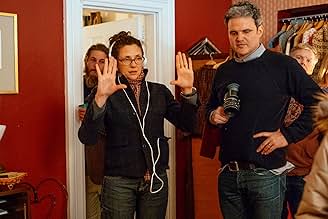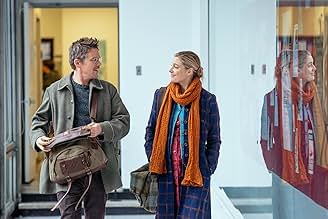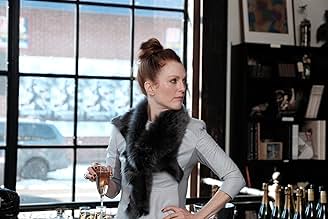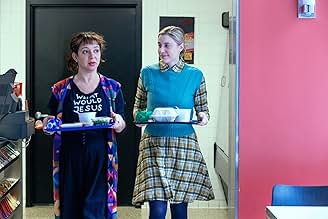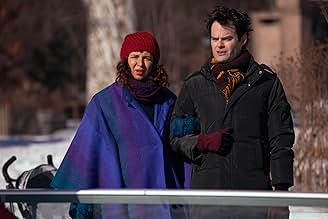NOTE IMDb
6,2/10
19 k
MA NOTE
Maggie veut avoir un bébé et l'élever seule. Mais lorsqu'elle tombe amoureuse de John, un homme marié, tout se complique au point de compromettre ses plans.Maggie veut avoir un bébé et l'élever seule. Mais lorsqu'elle tombe amoureuse de John, un homme marié, tout se complique au point de compromettre ses plans.Maggie veut avoir un bébé et l'élever seule. Mais lorsqu'elle tombe amoureuse de John, un homme marié, tout se complique au point de compromettre ses plans.
- Réalisation
- Scénario
- Casting principal
- Récompenses
- 1 victoire et 9 nominations au total
Avis à la une
I think I got tricked into watching this movie by looking at the cast. There are undeniably good actors and actresses in this movie but that doesn't mean a certainty for success. On the contrary, it turned out to be a borefest. I couldn't wait for the end credits to appear. As for the comedy level I had two or three small grins, so nothing that will stay memorable for the rest of my life, like some other good comedies sometimes do. If you like endless debating about something dramatic like couples arguing about nothing then you might enjoy this. I can't believe I wasted my time with this one as it was clearly going to be really boring after only five minutes.
The eternal triangle and the romantic comedy have been soulmates forever but how many ways you can tell the same old love story? The era of female empowerment and emotional recycling is upon us, so it is refreshing to see Maggie's Plan (2016) take an old story formula and update it with offbeat humour centred on modern marriage. Contemporary lifestyle choices such as wanting a baby but not a man or handing a used lover back to a former owner are just some of the scenarios played out in this intelligent and delightful rom-rom.
The simple triangular plot pivots on independent-minded Maggie (Greta Gerwig), an over-controller who loves falling in love but cannot keep a relationship longer than six months. Wanting a baby without the strings, she arranges for a sperm donor just as she meets John (Ethan Hawke), an insecure academic who is emasculated by the stellar career of his imperious wife Georgette (Julianne Moore). John's need for constant mothering is no longer fulfilled by the dynamic Georgette, so Maggie and John inevitably pair up and one corner of the triangle disappears. Three years later, Maggie is over the needy John and his permanently incomplete 'great novel' so she hatches a plan to reunite John with Georgette. A clever script laced with tangled textual barbs like "ficto-critical anthropology" (Google it) and one-liners like "nobody unpacks commodity fetishism like you do" are rapid-fire and hilarious send-ups of the pretentious world of academe. It is at this level that the film shines brightest: not with belly laughs or madcap comedy, but through a whimsical lens focused on the world of intelligent people who think they control the ebbs and flows of the uncontrollable.
The acting performances are all top-shelf. Julianne Moore plays the understated dominatrix with a hilarious deadpan Danish accent, and Ethan Hawke is perfect as the hapless male out-powered by the females in his life. The standout performance is Greta Gerwig whose big doe-eyed innocence and naivety about the ways of the world make her scheming utterly forgivable. While the story has a predictable narrative arc, the dialogue is richly satirical, funny and totally female-centered. It is also an entertaining post-feminist comedy about sex and marriage which imagines a future where males are only needed for sperm and are then recycled amongst whoever will tolerate their innate weaknesses.
The simple triangular plot pivots on independent-minded Maggie (Greta Gerwig), an over-controller who loves falling in love but cannot keep a relationship longer than six months. Wanting a baby without the strings, she arranges for a sperm donor just as she meets John (Ethan Hawke), an insecure academic who is emasculated by the stellar career of his imperious wife Georgette (Julianne Moore). John's need for constant mothering is no longer fulfilled by the dynamic Georgette, so Maggie and John inevitably pair up and one corner of the triangle disappears. Three years later, Maggie is over the needy John and his permanently incomplete 'great novel' so she hatches a plan to reunite John with Georgette. A clever script laced with tangled textual barbs like "ficto-critical anthropology" (Google it) and one-liners like "nobody unpacks commodity fetishism like you do" are rapid-fire and hilarious send-ups of the pretentious world of academe. It is at this level that the film shines brightest: not with belly laughs or madcap comedy, but through a whimsical lens focused on the world of intelligent people who think they control the ebbs and flows of the uncontrollable.
The acting performances are all top-shelf. Julianne Moore plays the understated dominatrix with a hilarious deadpan Danish accent, and Ethan Hawke is perfect as the hapless male out-powered by the females in his life. The standout performance is Greta Gerwig whose big doe-eyed innocence and naivety about the ways of the world make her scheming utterly forgivable. While the story has a predictable narrative arc, the dialogue is richly satirical, funny and totally female-centered. It is also an entertaining post-feminist comedy about sex and marriage which imagines a future where males are only needed for sperm and are then recycled amongst whoever will tolerate their innate weaknesses.
Greetings again from the darkness. A significant portion of Woody Allen's film career has been projects that seem designed to appeal to (sometimes only) the New York intellectual sub-culture. You know the type
those who thrive on talking (incessantly) about all the things they know, often without really accomplishing anything themselves. They are the kind of people we usually laugh at, rather than with. Filmmaker Rebecca Miller appears ready to accept the passing of the Woody Allen baton, and at a minimum, her latest is heavily influenced by his comedic-brain food.
Ms. Miller casts perfectly for her first film in six plus years (The Secret Life of Pippa Lee, 2009). Greta Gerwig plays Maggie, whose ever-evolving "plan" is both the title and focus of the film. Ethan Hawke plays John, the middle-aged crisis guy who wants desperately to be showered with attention. Julianne Moore plays Georgette, John's slightly odd and brilliant wife, and mother to their two kids. Other key players include Travis Fimmel as Guy, a pickle entrepreneur and the center piece to Maggie's master plan; Bill Hader and Maya Rudolph as friends and confidants of Maggie; and Wallace Shawn, always a treat on screen.
The story starts out pretty simple, and then gets complicated, and then kind of loses focus before ending just right. Perpetually whining Maggie has admittedly given up on ever finding the kind of true love that results in a happy family. Because of this, she has recruited former schoolmate and math whiz and pickle dude Guy to supply the missing link for her artificial insemination. This leads to one of film's rare cheap laughs and one that not even the quirky Gerwig can pull off. A payroll mishap brings Maggie and aspiring novelist John (a 'ficto-critical anthropologist' by trade) together, and her willingness to read his writing and offer some support, is all it takes to finish off John's slowly disintegrating marriage to Georgette (Ms. Moore dusting off the Euro accent she used in The Big Lebowski).
Writer/director Miller is the daughter of famed playwright Arthur Miller, who wrote Death of a Salesman and was once married to Marilyn Monroe (after Joe DiMaggio). She also directed The Ballad of Jack and Rose, which starred her husband, Oscar winner Daniel Day-Lewis. Much of her latest film feels contrived and over-written as if every scene carries the burden of generating a laugh out loud moment. It shouldn't be too surprising that the ultra talented Julianne Moore creates the most interesting character, though unfortunately, she has the least amount of screen time among the three leads. It's good for a few laughs, as well as some cringing and an ending that actually works.
Ms. Miller casts perfectly for her first film in six plus years (The Secret Life of Pippa Lee, 2009). Greta Gerwig plays Maggie, whose ever-evolving "plan" is both the title and focus of the film. Ethan Hawke plays John, the middle-aged crisis guy who wants desperately to be showered with attention. Julianne Moore plays Georgette, John's slightly odd and brilliant wife, and mother to their two kids. Other key players include Travis Fimmel as Guy, a pickle entrepreneur and the center piece to Maggie's master plan; Bill Hader and Maya Rudolph as friends and confidants of Maggie; and Wallace Shawn, always a treat on screen.
The story starts out pretty simple, and then gets complicated, and then kind of loses focus before ending just right. Perpetually whining Maggie has admittedly given up on ever finding the kind of true love that results in a happy family. Because of this, she has recruited former schoolmate and math whiz and pickle dude Guy to supply the missing link for her artificial insemination. This leads to one of film's rare cheap laughs and one that not even the quirky Gerwig can pull off. A payroll mishap brings Maggie and aspiring novelist John (a 'ficto-critical anthropologist' by trade) together, and her willingness to read his writing and offer some support, is all it takes to finish off John's slowly disintegrating marriage to Georgette (Ms. Moore dusting off the Euro accent she used in The Big Lebowski).
Writer/director Miller is the daughter of famed playwright Arthur Miller, who wrote Death of a Salesman and was once married to Marilyn Monroe (after Joe DiMaggio). She also directed The Ballad of Jack and Rose, which starred her husband, Oscar winner Daniel Day-Lewis. Much of her latest film feels contrived and over-written as if every scene carries the burden of generating a laugh out loud moment. It shouldn't be too surprising that the ultra talented Julianne Moore creates the most interesting character, though unfortunately, she has the least amount of screen time among the three leads. It's good for a few laughs, as well as some cringing and an ending that actually works.
A narcissistic man-child falls for a frumpy, Midwestern stereotype, leaves his German shrew-wife, then vacillates back and forth pointlessly.
Bonus: a foreigner selling artisanal pickles to Whole Foods for distribution, and a child attending "Eurythmics" class. I honestly can't tell if this is all an elaborate trolling effort.
The only humor in this "comedy" are a few bitter lines from the comedians.
I would write more, but honestly, there's nothing more to say. It's an almost empty film. My interest in the actors was the only thing compelling me to watch.
Bonus: a foreigner selling artisanal pickles to Whole Foods for distribution, and a child attending "Eurythmics" class. I honestly can't tell if this is all an elaborate trolling effort.
The only humor in this "comedy" are a few bitter lines from the comedians.
I would write more, but honestly, there's nothing more to say. It's an almost empty film. My interest in the actors was the only thing compelling me to watch.
Among many other things, the best dialogue-driven character studies can create a sense of real connectedness between the viewer and the people depicted on screen. If well narrated, those films can serve as a mirror to your own experiences or open up new perspectives on life in general. Directors that have managed to achieve this in the past like (the early) Woody Allen or Noah Baumbach are also often named as references when it comes to Rebecca Miller's latest film Maggie's Plan.
Indeed, when you saw the trailer, you got the feeling a new Baumbach is coming up: set in New York, starring Greta Gerwig playing a Gerta Gerwig-character and a plot revolving around existential questions of a group of well-educated, slightly quirky people. I love all of these elements and mixed with a cast including Ethan Hawke and Julianne Moore I was very excited to see this film.
However, the aspects of indie films I mentioned above which I deem so important are all missing here. Once you have accepted the awkward premise (which is far-fetched enough) that the protagonist Maggie (Greta Gerwig) desperately wants to reunite her husband John (Ethan Hawke) with his ex-wife (Julianne Moore), the film misses all its chances to handle the characters' issues with precision and depth. This starts with the poor writing which does include some amusing lines and interesting insights (my favourite being John's take on unborn babies) but still fails to make the characters' motivations and intentions appear reasonable. Despite the fact that they are always quite short, films like The Squid and the Whale never feel rushed. In Maggie's Plan we see many rapid developments and turns in attitude that are often hard to make sense of.
Apart from problems in the script, the film suffers from the way it is directed. One major element is a trope that is more than predominant in recent cinema which comes down to a formula many directors seem to have internalised deeply: Shaky camera = Authenticity. In order to immerse the viewer within a scene, many films employ this technique, however in many cases in such a exaggerated manner that it becomes a parody of itself (Exhibit A: The Hunger Games; Counterexample (how it should be done): Children of Men). The same is the case in Maggie's Plan. It is the film's ambition to live up to its predecessors by offering a perspective that feels true to life. But unnecessary zoom-ins, shakes and pans occasionally disrupt the viewing experience. Films that rely on quiet, emotional scenes like this one benefit from a rather still, observant depiction, so that the viewer likely forgets that there is a camera.
Having said all this, I still consider Maggie's Plan an average film which is mostly due to the cast. The actors do what they can to give the weird script at least some emotional depth (even though I add Julianne Moore's choice of accent to the list of things that bewildered me). My harsh critique is probably due to high expectations. But I just didn't assume they were that high, as I would have been happy, if some main elements that separate these kinds of films from major blockbusters had been displayed.
My main concern with this review is to counter the many voices comparing this film to indie masterpieces like Frances Ha or Annie Hall. Maggie's Plan is not even close to being in the same league. To quote Pulp Fiction, it is not even the same sport.
Indeed, when you saw the trailer, you got the feeling a new Baumbach is coming up: set in New York, starring Greta Gerwig playing a Gerta Gerwig-character and a plot revolving around existential questions of a group of well-educated, slightly quirky people. I love all of these elements and mixed with a cast including Ethan Hawke and Julianne Moore I was very excited to see this film.
However, the aspects of indie films I mentioned above which I deem so important are all missing here. Once you have accepted the awkward premise (which is far-fetched enough) that the protagonist Maggie (Greta Gerwig) desperately wants to reunite her husband John (Ethan Hawke) with his ex-wife (Julianne Moore), the film misses all its chances to handle the characters' issues with precision and depth. This starts with the poor writing which does include some amusing lines and interesting insights (my favourite being John's take on unborn babies) but still fails to make the characters' motivations and intentions appear reasonable. Despite the fact that they are always quite short, films like The Squid and the Whale never feel rushed. In Maggie's Plan we see many rapid developments and turns in attitude that are often hard to make sense of.
Apart from problems in the script, the film suffers from the way it is directed. One major element is a trope that is more than predominant in recent cinema which comes down to a formula many directors seem to have internalised deeply: Shaky camera = Authenticity. In order to immerse the viewer within a scene, many films employ this technique, however in many cases in such a exaggerated manner that it becomes a parody of itself (Exhibit A: The Hunger Games; Counterexample (how it should be done): Children of Men). The same is the case in Maggie's Plan. It is the film's ambition to live up to its predecessors by offering a perspective that feels true to life. But unnecessary zoom-ins, shakes and pans occasionally disrupt the viewing experience. Films that rely on quiet, emotional scenes like this one benefit from a rather still, observant depiction, so that the viewer likely forgets that there is a camera.
Having said all this, I still consider Maggie's Plan an average film which is mostly due to the cast. The actors do what they can to give the weird script at least some emotional depth (even though I add Julianne Moore's choice of accent to the list of things that bewildered me). My harsh critique is probably due to high expectations. But I just didn't assume they were that high, as I would have been happy, if some main elements that separate these kinds of films from major blockbusters had been displayed.
My main concern with this review is to counter the many voices comparing this film to indie masterpieces like Frances Ha or Annie Hall. Maggie's Plan is not even close to being in the same league. To quote Pulp Fiction, it is not even the same sport.
Le saviez-vous
- AnecdotesThe language that Julianne Moore and her kids speak is Danish.
- Bandes originalesMusical Communion
Written by Don Drummond & Arthur Stanley Reid
Performed by Baba Brooks
Courtesy of Push Music / Treasure Isle
Courtesy of Sanctuary Records Group Ltd., a BMG Company
All rights administered by BMG Rights Management (US) LLC
Meilleurs choix
Connectez-vous pour évaluer et suivre la liste de favoris afin de recevoir des recommandations personnalisées
- How long is Maggie's Plan?Alimenté par Alexa
Détails
- Date de sortie
- Pays d’origine
- Sites officiels
- Langues
- Aussi connu sous le nom de
- El plan de Maggie
- Lieux de tournage
- 45 Broadway, Brooklyn, Ville de New York, New York, États-Unis(Maggie's apartment)
- Sociétés de production
- Voir plus de crédits d'entreprise sur IMDbPro
Box-office
- Montant brut aux États-Unis et au Canada
- 3 351 735 $US
- Week-end de sortie aux États-Unis et au Canada
- 63 308 $US
- 22 mai 2016
- Montant brut mondial
- 5 883 891 $US
- Durée
- 1h 38min(98 min)
- Couleur
- Mixage
- Rapport de forme
- 1.85 : 1
Contribuer à cette page
Suggérer une modification ou ajouter du contenu manquant







